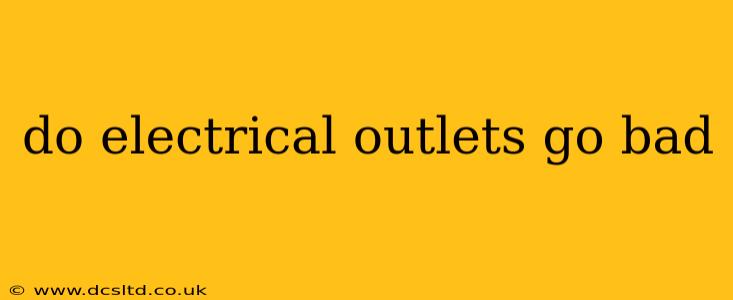Do Electrical Outlets Go Bad? A Comprehensive Guide
Yes, electrical outlets can definitely go bad, and understanding why is crucial for home safety and efficient energy use. While they might seem like simple fixtures, outlets are vital components of your home's electrical system, and their failure can lead to various problems, from flickering lights to serious electrical hazards. This article will explore the common reasons why outlets fail and what you can do about it.
What are the signs that an electrical outlet is going bad?
This is a common question, and recognizing the warning signs is key to preventing more significant issues. Look out for these:
-
Loose Outlets: If your plugs frequently fall out of the socket, it indicates a loose connection, a clear sign the outlet needs attention. This loose connection can lead to overheating and potential fire hazards.
-
Flickering or Dim Lights: A faulty outlet can sometimes cause nearby lights to flicker or dim. This is especially true if the outlet is overloaded or has a damaged internal connection.
-
Warm or Hot Outlets: Feeling heat emanating from an outlet is a serious warning sign. This indicates a significant problem, possibly a loose wire connection or an overloaded circuit, posing a substantial fire risk. Never ignore a hot outlet!
-
Burning Smell: If you detect a burning smell near an outlet, immediately switch off the power at the breaker box and call a qualified electrician. This indicates severe damage and a potential fire hazard.
-
Outlet Doesn't Work: This is the most obvious sign. If an outlet simply stops working, the problem could be within the outlet itself, or it could be a more widespread circuit issue.
What causes electrical outlets to fail?
Several factors can contribute to an outlet's demise:
-
Loose Wiring: Over time, wires can loosen within the outlet box, leading to poor connections and overheating. This is often exacerbated by repeated plugging and unplugging of appliances.
-
Overloading the Circuit: Plugging too many appliances into a single outlet or circuit can overload it, causing overheating and potentially damaging the outlet.
-
Age and Wear: Like any other electrical component, outlets wear out over time due to continuous use and exposure to environmental factors.
-
Water Damage: Exposure to moisture can cause corrosion within the outlet, leading to poor connections and electrical hazards.
-
Poor Installation: Improper installation from the outset can lead to problems down the line. This highlights the importance of hiring a qualified electrician for any electrical work.
How can I fix a bad electrical outlet?
Disclaimer: Unless you have extensive experience and knowledge of electrical work, attempting DIY repairs on electrical outlets is extremely dangerous and should be avoided. Incorrect repairs can lead to electrical shocks, fires, and other serious injuries.
Always call a qualified electrician to inspect and repair any faulty electrical outlets.
How often should I check my electrical outlets?
Regular inspection is a proactive approach to home safety. While there's no hard and fast rule, it's wise to visually inspect your outlets at least once a year. Pay close attention to areas prone to moisture, such as bathrooms and kitchens.
Can I prevent electrical outlets from going bad?
While you can't completely prevent outlets from eventually failing due to age and wear, you can take steps to extend their lifespan:
-
Avoid overloading circuits. Distribute power needs evenly across multiple outlets and circuits.
-
Use surge protectors. Surge protectors can protect your appliances and outlets from voltage spikes, extending their lifespan.
-
Regularly inspect your outlets. Addressing minor issues promptly can prevent them from escalating into major problems.
-
Ensure proper ventilation around outlets. This will help prevent overheating.
-
Keep outlets dry. Prevent water damage by ensuring no leaks or moisture near your outlets.
By understanding the signs of a failing outlet, taking preventative measures, and calling a qualified electrician when necessary, you can significantly reduce the risk of electrical hazards and maintain a safe home environment.
